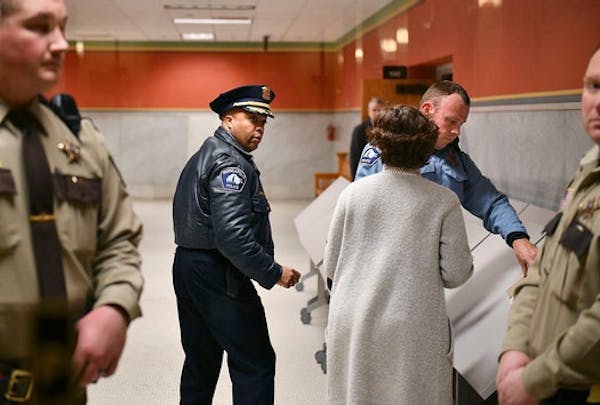A knife-wielding man shot by Minneapolis police in an interview room at City Hall clung to life Tuesday, while union officials said officers followed proper procedures when handling an armed suspect believed to be a threat to himself and others.
Officers fired several shots on Monday after the 18-year-old, identified as Marcus Fischer of Minneapolis, displayed a knife and began repeatedly stabbing himself in the chest and neck, ignoring commands to throw down the weapon, according to multiple law enforcement sources.
Fischer was hospitalized with critical injuries; department sources said it was uncertain if he would survive.
Police brought Fischer in for questioning about a Dec. 13 robbery in Minneapolis, in which a 21-year-old man was shot during a gun deal gone awry, police records showed.
Fischer was arrested about 2:25 p.m. Monday by members of the department's Violent Criminal Apprehension Team and turned over to the detective handling the shooting case. Fischer also has a weapons possession case pending.
Police took Fischer to an interview room in an area that houses such specialized units as homicide and robbery.
Suspects are seldom handcuffed during interviews, sources said, and it isn't unusual for detectives to leave a suspect alone periodically.
At some point, investigators left Fischer unattended. When they returned, he had a knife and had stabbed himself at least 11 times in the neck and chest and was trying to slash his throat. By then, more officers came running, drawn by the commotion, according to a source familiar with the case.
When Fischer ignored commands to drop the knife and get on his knees, police used a Taser to try to subdue him, sources say. When that didn't work, officers opened fire.
The state Bureau of Criminal Apprehension, which is investigating the incident, said agents are in the process of interviewing officers who were involved in or witnessed the shooting.
The BCA said it would provide the names of the officers once all of those interviews have been done.
At a news conference hours after the shooting, Police Chief Medaria Arradondo said the incident was captured on camera. In a statement Tuesday, he said "all facets of the investigation," were given to the BCA.
Police have said they will review the department policy for in-custody interviews to determine how Fischer got the knife into the room.
A message left for the BCA wasn't returned on Tuesday, while Minneapolis police declined to comment on the incident, citing the ongoing investigation.
The officers who fired their guns were placed on paid administrative leave, which is standard after an officer-involved shooting. None has been identified.
Several others who witnessed the encounter were placed on "traumatic incident leave," officials said.
Lt. Bob Kroll, head of the police union, said the officers tried for about 10 minutes to "de-escalate" the situation and convince Fischer to drop his knife. They fired their weapons, he said, after they couldn't subdue Fischer with a Taser.
"The officers saved this guy's life, rather than took it," said Kroll, who was present when several of the officers involved spoke with BCA investigators on Monday night. "The officers in this one are complete heroes."
Kroll declined to discuss the matter further, he said, to avoid interfering with the ongoing investigation.
"My wish is that they'd release the entire video to you guys, showing you this is what cops have to go through," Kroll said.
St. Paul attorney Paul Applebaum, who has represented plaintiffs in police brutality cases, wondered whether officers could have tried other means to disarm Fischer, other than opening fire in the cramped confines of an interview room.
"You've got a whole bunch of other cops who were armed; worst case situation is that you've got other cops draw their guns and then you've got this kind of O.K. Corral-type of situation," said Applebaum. "It could've been a nightmare."
A sign that appeared Tuesday outside Room 108, where the shooting occurred, read that visitors could be subject to random searches.
Community responses to the incident were more muted than more high-profile police shootings in recent years, which have ignited large protests and calls for changes in police practices.
Sue Abderholden, executive director of the Minnesota chapter of the National Alliance on Mental Illness, said that police departments in Minneapolis and elsewhere are increasingly embracing the concepts of de-escalation, which encourage officers to avoid pulling the trigger and find other means to resolve potentially dangerous situations.
Still, she said, each case is unique. "Sometimes with people, if they're extremely psychotic, sometimes Tasers don't work," she said.
The department overhauled its use-of-force policy last fall.
Under the new policy, officers are required to exhaust reasonable options to defuse dangerous situations before using force, while emphasizing "sanctity of life" and de-escalation.
A later effort to stiffen the policy was blocked by the union, which argued that it effectively removed officers' discretion.
Libor Jany • 612-673-4064 Twitter:@StribJany

Souhan: This is KAT's chance to prove Flip was right

